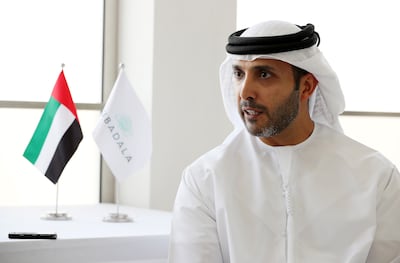Mubadala Investment Company, Abu Dhabi’s sovereign investment arm, has made an investment in the US-based Aligned Data Centres, as it continues to expand its global digital infrastructure portfolio.
With the latest investment, Mubadala will become a minority stakeholder in the pan-Americas data centre company, alongside majority partners managed by Macquarie Asset Management, it said in a statement on Wednesday.
Mubadala did not give the size of its stake in Aligned nor the financial details of the transaction.
“Our investment will support Aligned’s rapid expansion, further reinforcing the company’s position as a preferred partner in the Pan-American data centre market,” said Khaled Al Qubaisi, chief executive of real estate and infrastructure investments at Mubadala.
“In addition to Aligned’s continued business growth, we are further excited by its AI-ready status, making it strategically positioned to support infrastructure requirements for a broad set of … services.”
Aligned offers solutions to support global hyperscale and enterprise customers, helping to meet the demand for sustainable and scalable infrastructure.
The company’s footprint will span more than 2.5 gigawatts of critical capacity across more than 40 data centres at full build-out, Mubadala said.
While the majority of the group’s operations are in North America, Aligned has recently expanded into Latin America with its acquisition of LatAm data centre provider Odata.
The deal positions Aligned among the largest private data centre operators in the Americas. Its growing Latin American operations include data centres in Brazil, Chile, Colombia and Mexico.
The partnership with Mubadala will “support Aligned’s continued growth trajectory and expanding data centre platform, as well as a collective focus on building a more sustainable future through innovative, efficient infrastructure”, said Andrew Schaap, chief executive at Aligned.
“This investment is a testament to our … ability to quickly address the growing capacity demands and requirements of our loyal hyperscale and enterprise customers across the Americas.”
The Aligned investment builds on Mubadala’s growing digital infrastructure presence in the US.
In June, Mubadala committed to invest $500 million in the US-based broadband and telecoms services company Brightspeed to take a minority stake.
Mubadala is investing in the company alongside investment funds managed by affiliates of New York-listed Apollo Global Management, it said at the time.
Based in Charlotte, North Carolina, Brightspeed is the fifth-largest “incumbent local exchange carrier” in the US, with the capability of serving more than 6.5 million homes and businesses in mainly rural and suburban communities in the US Midwest, South-East and parts of Pennsylvania and New Jersey.
The recent investments are part of Mubadala’s rapidly expanding global digital infrastructure portfolio.
Mubadala’s real estate and infrastructure investments platform, which focuses at investments in traditional and digital infrastructure around the globe, has a strong deal pipeline, Mr Al Qubaisi told The National in an interview in April.
The platform – one of the four core businesses of Mubadala – has invested about $7 billion since being carved out as a separate pillar in 2021. At any given time, it is actively evaluating 10 deals each in digital and traditional infrastructure sectors, as well as real estate transactions, he said at the time.
Last year, Mubadala invested $350 million into Princeton Digital Group, a pan-Asian data centre company focused on expanding data centre services to meet increasing demand in Asia.
The Abu Dhabi company has also invested £800 million ($1.02 billion) in CityFibre, the UK’s largest independent full-fibre platform.
Will the pound fall to parity with the dollar?
The idea of pound parity now seems less far-fetched as the risk grows that Britain may split away from the European Union without a deal.
Rupert Harrison, a fund manager at BlackRock, sees the risk of it falling to trade level with the dollar on a no-deal Brexit. The view echoes Morgan Stanley’s recent forecast that the currency can plunge toward $1 (Dh3.67) on such an outcome. That isn’t the majority view yet – a Bloomberg survey this month estimated the pound will slide to $1.10 should the UK exit the bloc without an agreement.
New Prime Minister Boris Johnson has repeatedly said that Britain will leave the EU on the October 31 deadline with or without an agreement, fuelling concern the nation is headed for a disorderly departure and fanning pessimism toward the pound. Sterling has fallen more than 7 per cent in the past three months, the worst performance among major developed-market currencies.
“The pound is at a much lower level now but I still think a no-deal exit would lead to significant volatility and we could be testing parity on a really bad outcome,” said Mr Harrison, who manages more than $10 billion in assets at BlackRock. “We will see this game of chicken continue through August and that’s likely negative for sterling,” he said about the deadlocked Brexit talks.
The pound fell 0.8 per cent to $1.2033 on Friday, its weakest closing level since the 1980s, after a report on the second quarter showed the UK economy shrank for the first time in six years. The data means it is likely the Bank of England will cut interest rates, according to Mizuho Bank.
The BOE said in November that the currency could fall even below $1 in an analysis on possible worst-case Brexit scenarios. Options-based calculations showed around a 6.4 per cent chance of pound-dollar parity in the next one year, markedly higher than 0.2 per cent in early March when prospects of a no-deal outcome were seemingly off the table.
Bloomberg
Global state-owned investor ranking by size
|
1.
|
United States
|
|
2.
|
China
|
|
3.
|
UAE
|
|
4.
|
Japan
|
|
5
|
Norway
|
|
6.
|
Canada
|
|
7.
|
Singapore
|
|
8.
|
Australia
|
|
9.
|
Saudi Arabia
|
|
10.
|
South Korea
|
The smuggler
Eldarir had arrived at JFK in January 2020 with three suitcases, containing goods he valued at $300, when he was directed to a search area.
Officers found 41 gold artefacts among the bags, including amulets from a funerary set which prepared the deceased for the afterlife.
Also found was a cartouche of a Ptolemaic king on a relief that was originally part of a royal building or temple.
The largest single group of items found in Eldarir’s cases were 400 shabtis, or figurines.
Khouli conviction
Khouli smuggled items into the US by making false declarations to customs about the country of origin and value of the items.
According to Immigration and Customs Enforcement, he provided “false provenances which stated that [two] Egyptian antiquities were part of a collection assembled by Khouli's father in Israel in the 1960s” when in fact “Khouli acquired the Egyptian antiquities from other dealers”.
He was sentenced to one year of probation, six months of home confinement and 200 hours of community service in 2012 after admitting buying and smuggling Egyptian antiquities, including coffins, funerary boats and limestone figures.
For sale
A number of other items said to come from the collection of Ezeldeen Taha Eldarir are currently or recently for sale.
Their provenance is described in near identical terms as the British Museum shabti: bought from Salahaddin Sirmali, "authenticated and appraised" by Hossen Rashed, then imported to the US in 1948.
- An Egyptian Mummy mask dating from 700BC-30BC, is on offer for £11,807 ($15,275) online by a seller in Mexico
- A coffin lid dating back to 664BC-332BC was offered for sale by a Colorado-based art dealer, with a starting price of $65,000
- A shabti that was on sale through a Chicago-based coin dealer, dating from 1567BC-1085BC, is up for $1,950
THE BIO
Born: Mukalla, Yemen, 1979
Education: UAE University, Al Ain
Family: Married with two daughters: Asayel, 7, and Sara, 6
Favourite piece of music: Horse Dance by Naseer Shamma
Favourite book: Science and geology
Favourite place to travel to: Washington DC
Best advice you’ve ever been given: If you have a dream, you have to believe it, then you will see it.
About Seez
Company name/date started: Seez, set up in September 2015 and the app was released in August 2017
Founder/CEO name(s): Tarek Kabrit, co-founder and chief executive, and Andrew Kabrit, co-founder and chief operating officer
Based in: Dubai, with operations also in Kuwait, Saudi Arabia and Lebanon
Sector: Search engine for car buying, selling and leasing
Size: (employees/revenue): 11; undisclosed
Stage of funding: $1.8 million in seed funding; followed by another $1.5m bridge round - in the process of closing Series A
Investors: Wamda Capital, B&Y and Phoenician Funds
'Worse than a prison sentence'
Marie Byrne, a counsellor who volunteers at the UAE government's mental health crisis helpline, said the ordeal the crew had been through would take time to overcome.
“It was worse than a prison sentence, where at least someone can deal with a set amount of time incarcerated," she said.
“They were living in perpetual mystery as to how their futures would pan out, and what that would be.
“Because of coronavirus, the world is very different now to the one they left, that will also have an impact.
“It will not fully register until they are on dry land. Some have not seen their young children grow up while others will have to rebuild relationships.
“It will be a challenge mentally, and to find other work to support their families as they have been out of circulation for so long. Hopefully they will get the care they need when they get home.”
Mohammed bin Zayed Majlis
What is a robo-adviser?
Robo-advisers use an online sign-up process to gauge an investor’s risk tolerance by feeding information such as their age, income, saving goals and investment history into an algorithm, which then assigns them an investment portfolio, ranging from more conservative to higher risk ones.
These portfolios are made up of exchange traded funds (ETFs) with exposure to indices such as US and global equities, fixed-income products like bonds, though exposure to real estate, commodity ETFs or gold is also possible.
Investing in ETFs allows robo-advisers to offer fees far lower than traditional investments, such as actively managed mutual funds bought through a bank or broker. Investors can buy ETFs directly via a brokerage, but with robo-advisers they benefit from investment portfolios matched to their risk tolerance as well as being user friendly.
Many robo-advisers charge what are called wrap fees, meaning there are no additional fees such as subscription or withdrawal fees, success fees or fees for rebalancing.
The%20specs%20
%3Cp%3E%3Cstrong%3EEngine%3A%20%3C%2Fstrong%3E2.0-litre%204cyl%20turbo%0D%3Cbr%3E%3Cstrong%3EPower%3A%20%3C%2Fstrong%3E261hp%20at%205%2C500rpm%0D%3Cbr%3E%3Cstrong%3ETorque%3A%20%3C%2Fstrong%3E400Nm%20at%201%2C750-4%2C000rpm%0D%3Cbr%3E%3Cstrong%3ETransmission%3A%20%3C%2Fstrong%3E7-speed%20dual-clutch%20auto%0D%3Cbr%3E%3Cstrong%3EFuel%20consumption%3A%20%3C%2Fstrong%3E10.5L%2F100km%0D%3Cbr%3E%3Cstrong%3EOn%20sale%3A%20%3C%2Fstrong%3ENow%0D%3Cbr%3E%3Cstrong%3EPrice%3A%20%3C%2Fstrong%3EFrom%20Dh129%2C999%20(VX%20Luxury)%3B%20from%20Dh149%2C999%20(VX%20Black%20Gold)%3C%2Fp%3E%0A
UAE currency: the story behind the money in your pockets



